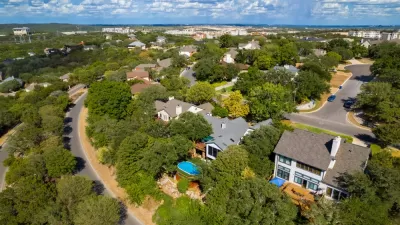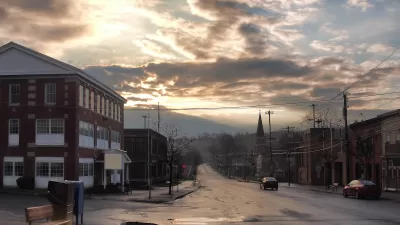Citing a dire housing situation for low-income renters, Columbus, Ohio is considering its first community land trust. The aim is to create housing alternatives for low-income residents of revitalizing neighborhoods.

According to a 2017 report, Jared Brey writes, rents are rising faster than incomes in Columbus, Ohio, while the number of residents in poverty is going up faster than the total population. "On top of all that, more [than] 10,000 housing units built in Columbus with federal subsidies have affordability requirements that expire in the next five years."
The City of Columbus and Franklin County may join forces to develop permanently affordable for-sale housing on vacant lots owned by their land banks. The pilot community land trust would start out small: $3.8 million and just 30 or 40 homes to begin with.
The community land trust would build on the land banks' solid anti-blight record. "In the last five years, according to a recent study, the city and county land banks combined have demolished 1,600 blighted buildings, helped find new uses for 1,300 properties, and reduced the overall level of vacancy in the city by 18 percent,' Brey writes.
Backers of the project say it will preserve the ability of mixed-income residents to buy (or, in reality, long-term lease) houses in neighborhoods that are revitalizing. Meanwhile, Columbus voters may also approve a $1 billion bond package in the upcoming May 7 general election that includes $50 million for affordable housing.
FULL STORY: Keeping Affordability in Focus As Columbus Revitalization Picks up Steam

Alabama: Trump Terminates Settlements for Black Communities Harmed By Raw Sewage
Trump deemed the landmark civil rights agreement “illegal DEI and environmental justice policy.”

Planetizen Federal Action Tracker
A weekly monitor of how Trump’s orders and actions are impacting planners and planning in America.

How Atlanta Built 7,000 Housing Units in 3 Years
The city’s comprehensive, neighborhood-focused housing strategy focuses on identifying properties and land that can be repurposed for housing and encouraging development in underserved neighborhoods.

In Both Crashes and Crime, Public Transportation is Far Safer than Driving
Contrary to popular assumptions, public transportation has far lower crash and crime rates than automobile travel. For safer communities, improve and encourage transit travel.

Report: Zoning Reforms Should Complement Nashville’s Ambitious Transit Plan
Without reform, restrictive zoning codes will limit the impact of the city’s planned transit expansion and could exclude some of the residents who depend on transit the most.

Judge Orders Release of Frozen IRA, IIJA Funding
The decision is a victory for environmental groups who charged that freezing funds for critical infrastructure and disaster response programs caused “real and irreparable harm” to communities.
Urban Design for Planners 1: Software Tools
This six-course series explores essential urban design concepts using open source software and equips planners with the tools they need to participate fully in the urban design process.
Planning for Universal Design
Learn the tools for implementing Universal Design in planning regulations.
Jessamine County Fiscal Court
Caltrans
Institute for Housing and Urban Development Studies (IHS)
City of Grandview
Harvard GSD Executive Education
Toledo-Lucas County Plan Commissions
Salt Lake City
NYU Wagner Graduate School of Public Service





























